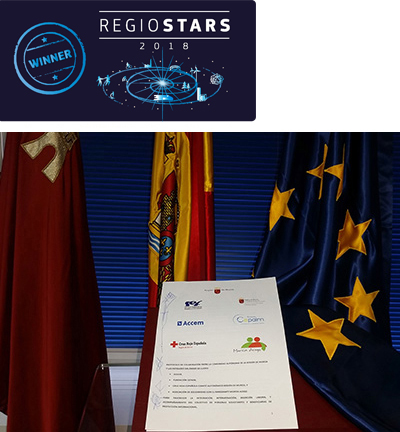Refugees in the Spanish region of Murcia are receiving personal plans and ‘one-stop-shop’ support to find work and settle into the local community. An integration and inclusion programme by Murcia’s Regional Employment and Training Service (SEF) offers courses, help to obtain documents and job-matching adapted to each refugee’s needs. Spain’s Service for Social Policies, SEF and four NGOs also contribute expert staff and services, while participating businesses receive advice on how to employ refugees. Refugees can integrate more easily, while the region can make full use of their skills.
Personalised labour market integration and social inclusion for refugees in Murcia, Spain
- 05 September 2018
Behind each refugee statistic is a person. Our programme offers a personalised and coordinated response to help them design a self-sufficient, peaceful life for themselves.
Through the project a social worker first prepares a plan for each participating refugee to help them overcome barriers to a life in Spain. Practical support can include Spanish lessons, courses in Spanish life and help from an SEF job counsellor to apply for work that matches their skills.
The social worker, in close contact with the job counsellor, is the refugee’s only contact point for all organisations in the plan and helps refugees stay on track in their search for employment. Almost half of all working-age refugees are now in this programme, improving their chances of success.
Specialist support
Over 600 people in Murcia are refugees. Three quarters are of working age. Support to find work and integrate has to be tailored, sensitive and long-term to be effective. Refugees are from around 20 different countries and diverse backgrounds. Many are in a fragile emotional state after fleeing traumatic situations.
The Murcia Regional Employment and Training Service developed a labour market integration and social inclusion programme for refugees to coordinate available expert support and use resources more efficiently. To do so, it adapted its 2017 RegioStars-award-winning programme for another vulnerable group – survivors of gender-based violence.
Launched in 2017, the new programme combines services from the Employment and Training Service with those from organisations that receive refugees when they arrive in Murcia. These are Spain’s Service for Social Policies and four NGOs – the Spanish Catholic Commission of Migration Association (ACCEM), the Cepaim Foundation, the Spanish Red Cross Region of Murcia and the Murcia Acoge Association.
The programme allows refugees to access support from all these organisations through a trained contact person – a social worker from the Service for Social Policies, coordinating with a job counsellor – following a process that is planned from start to end.
Sustainable process
Employers and inclusion are part of the process. Key skills courses help refugees demonstrate their training from their country of origin, while advice for businesses helps them employ refugees sustainably. Meanwhile, life skills courses give refugees a short cut to understanding local ways of doing things, such as how to make a doctor’s appointment in the Spanish health care system.
Refugees can access the programme throughout Murcia, either in Employment and Training Service offices or offices of the four NGOs. In 2018, the service also held a conference to promote its refugee-related resources. Thanks to this availability, 40 % of working-age refugees are now looking for work, in training or getting support through the Employment and Training Service. The programme has also set up a method to obtain reliable data on refugees in Murcia to remove institutional barriers to their integration.
The EU has funded 25 % of the programme’s costs up to 2020, with the other 75 % financed by the Regional Government of Murcia and the Spanish Ministry of Employment and Social Security. Beyond this period, the Region of Murcia will be able to maintain the project through its own budget.
Beneficiaries
“To have to escape from your country is very hard. It means leaving everything and all the people who are significant in your life. You are alone and confused. Since I arrived in Murcia the programme has helped me to learn Spanish, to study hairstyling and to get an official diploma. I already have friends and I will start working in a few days!’’
Mohamad Tarek Gellawi, refugee now in work
“When I escaped from my country, I took sadness, desperation, loneliness and fear with me. After a long journey I arrived in Murcia. I didn’t know what to do or where to begin. Since I joined the programme they have guided and helped me. I feel like someone is on my side and I have hope again. I already can speak Spanish, I have studied and I hope that with all this help, I can get a job.”
Anonymous at the beneficiary’s request, refugee ready to find work
Total investment and EU funding
Total investment for the project “Labour Integration and Social Inclusion of Refugees” is EUR 157 500, with the EU’s European Social Fund contributing EUR 39 375 through the “Region de Murcia” Operational Programme for the 2014-2020 programming period. The investment falls under the priorities “Employment and labour market” and “Social inclusion”.

